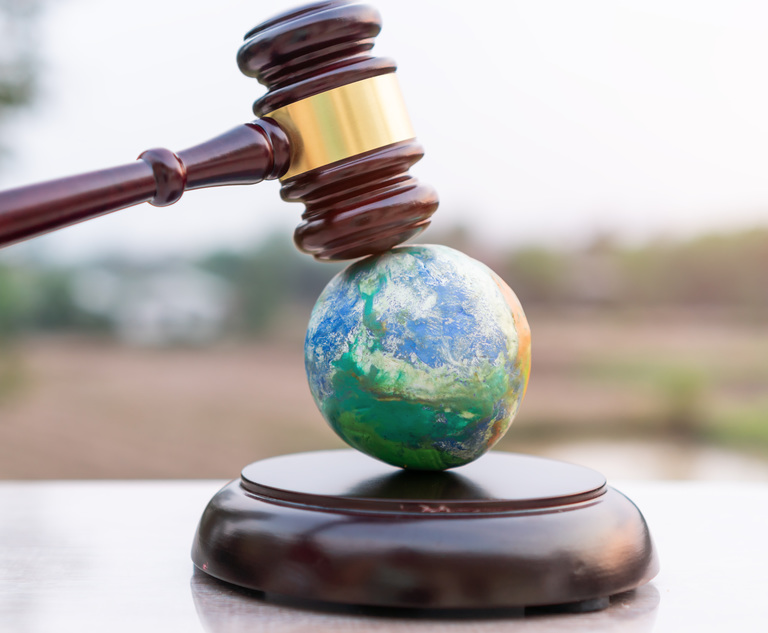Michael B. Gerrard
Michael B. Gerrard is a professor at Columbia Law School and founder and faculty director of the Sabin Center for Climate Change Law. Among his books is Global Climate Change and U.S. Law (3rd ed., co-edited with. Jody Freeman and Michael Burger, 2023).

March 07, 2023 | New York Law Journal
New York's Green Amendment: The First DecisionsThis column discusses the emerging jurisprudence under what has been called New York's Green Amendment.
By Michael B. Gerrard and Edward McTiernan
8 minute read

January 11, 2023 | New York Law Journal
New York Environmental Legislation in 2022Several significant environmental bills were enacted by the New York legislature and signed by Gov. Kathy Hochul in 2022, and several others were vetoed.
By Michael B. Gerrard and Edward McTiernan
12 minute read

November 09, 2022 | New York Law Journal
Extreme Weather and Chemical and Waste Management RegulationsSeveral regulations exist to protect chemical and waste facilities against extreme weather events. It is not clear that they all are being adequately implemented, and the existing rules leave many holes.
By Michael B. Gerrard and Edward McTiernan
10 minute read

September 07, 2022 | New York Law Journal
Three New Federal Laws Aid New York's Compliance With Climate GoalsNew York's draft CLCPA scoping plan devotes the greatest attention to three emitting sectors—transportation, electricity and buildings. The three new federal laws, together, provide tremendous financial and other aid for all three. All the work New York has already done on these sectors gives the state a head start in seeking these funds.
By Michael B. Gerrard and Edward McTiernan
11 minute read

July 13, 2022 | New York Law Journal
Annual Survey of SEQRA Cases: Bad for Plaintiffs, But Important Bill PendingThe most important SEQRA development by far will come if Governor Kathy Hochul signs a bill that would amend the statute by requiring far more baseline and cumulative impact review, and barring the issuance and renewal of permits that would have disproportionate impacts.
By Michael B. Gerrard and Edward McTiernan
9 minute read

May 11, 2022 | New York Law Journal
Legislature Expands State's Jurisdiction Over Freshwater WetlandsThe 2022 budget legislation expanded DEC's role by changing the definition of areas that constitute a regulated freshwater wetland.
By Michael B. Gerrard and Edward McTiernan
8 minute read

March 09, 2022 | New York Law Journal
Regulation of Polyfluoroalkyl Chemicals in New YorkNew York has taken action to address PFOA and PFOS in all environmental media and across many regulatory programs. However, the need to consider PFOA and PFOS is still expanding, and industrial operators, business owners and their counsel should continue to closely monitor developments and pronouncements from the Legislature, DEC and DOH.
By Michael B. Gerrard and Edward McTiernan
9 minute read

January 12, 2022 | New York Law Journal
New York Environmental Legislation in 2021This annual survey of New York environmental legislation describes numerous new laws on single-use plastics, lead exposure, drinking water, fuel oil, climate resilience, solar energy, invasive species and other areas that were signed into law in 2021.
By Michael B. Gerrard and Edward McTiernan
10 minute read

November 10, 2021 | New York Law Journal
Potential Tensions Between New York's Climate Change Laws and Historic Preservation LawsDoing everything reasonably possible to reduce GHG emissions will require many tradeoffs, and the sacrifice of some things of great value in service of the greater goal of meeting the climate threat.
By Michael B. Gerrard and Edward McTiernan
9 minute read

September 08, 2021 | New York Law Journal
Review of 2020 Cases Under SEQRAIn 2020, the courts decided 47 cases under the New York State Environmental Quality Review Act (SEQRA). In this edition of their Environmental Law article—the 30th anniversary of this column's first annual SEQRA review—Michael Gerrard and Edward McTiernan discuss the cases, which continued the familiar pattern that the safest way for a controversial project to withstand attack in court is to prepare a full EIS.
By Michael B. Gerrard and Edward McTiernan
9 minute read
More from ALM
- Scan In Progress: Litigators Leverage AI to Screen Prospective Jurors 1 minute read
- Legal Speak at General Counsel Conference East 2024: Match Group's Katie Dugan & Herrick's Carol Goodman 1 minute read
- Legal Speak at General Counsel Conference East 2024: Eric Wall, Executive VP, Syllo 1 minute read



